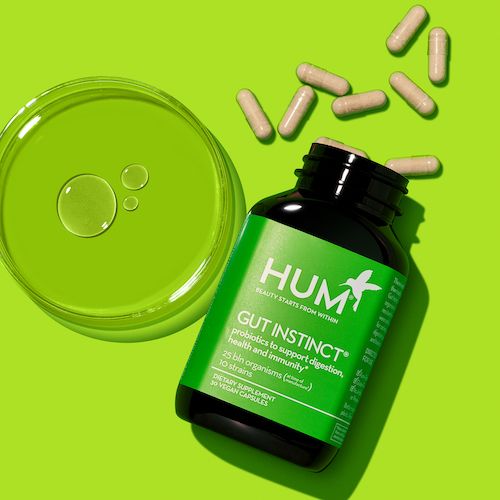We’ve all heard the buzzwords, but what is gut health? Why is it so important to your overall health and happiness?
We spoke with HUM Nutrition’s registered dietitian Gaby Vaca-Flores for a deep-dive into everything you’ll need to know about your gut, including how to spot the signs of an unhealthy one and what to do about it!

Gaby Vaca-Flores, RD, has a background in both beauty and nutrition which allows her to experience firsthand how herbs and natural ingredients play a role in how we look and feel. She is captivated by how food choices can determine mood, energy, skin texture and overall well-being, and encourages people to practice mindful eating with food as a powerful tool for inner and outer beauty.
What is gut health?
A healthy gut consists of a balanced microbiome and a properly functioning digestive system. Gut health is incredibly important for good digestion and getting the most out of the nutrients in our food. Moreover, gut health can influence many areas of our overall wellness, making it a key indicator for health.
How does your gut affect the rest of your body?
As a Registered Dietitian Nutritionist, I can’t emphasize enough the importance of a healthy gut. In addition to digestion, the gut participates in a number of bodily processes. For instance, a large part of our immune system resides in our GI tract, so ensuring a healthy gut is crucial for keeping our body’s defenses strong. Additionally, the gut is in constant communication with the emotional and cognitive centers of the brain which influence our body’s stress response and memory function. Weight and blood sugar management are also examples of how our gut health can impact the rest of our health.
How do I know if my gut is healthy? What are the signs of an unhealthy gut?
I always share with my patients that an upset stomach can be a major sign of an unhealthy gut. This can include uncomfortable digestive symptoms after eating such as bloating, excess gas, constipation, diarrhea, and heartburn. Adding on, visible signs can include skin redness or irritation and unintentional weight changes. Less obvious signs to look out for are low energy levels and poor sleeping patterns.

What are some tips you’d give for those who want to heal their gut?
1. Eat a diet that supports your body’s fiber needs.
Fiber helps promote the growth of good gut bacteria and can help keep your digestive system on track. Men should aim for 38 grams of fiber per day while women should consume 25 grams daily. Examples of foods high in fiber include pears, raspberries, avocados, and whole grain bread.
2. Focus on the good bacteria.
Restoring the balance of good bacteria in your gut is one of the best ways to improve your gut health. Adding in a probiotic supplement like HUM Nutrition’s Gut Instinct is an easy and effective way to add a diverse variety of beneficial strains to your gut.
3. Add prebiotic foods to your routine.
Foods high in prebiotic fibers help nurture the growth of good gut bacteria and can improve the function of your digestive system. Prebiotics can be found in everyday foods like apples, bananas, oats, and artichokes.
4. Stay hydrated.
Drinking enough water is an easy way to improve your gut health. Staying hydrated can have a positive impact on the mucosal lining of the stomach and intestines.
5. Chill out.
Due to the gut-brain axis, stress can wreak havoc on the health of your gut and your overall well-being. Practice de-stressing methods such as meditation, walking, playing with a pet, and spending time with loved ones.

Have questions? Check out the work Gaby and the Hum Nutritionists are doing to help everyone reach their health goals! Ready to get started with deliveries of plant-based and fiber rich meals? Sign up for one of our plans today!
